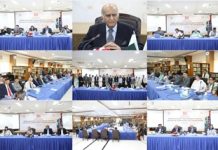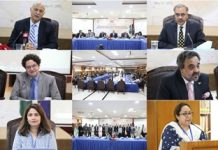PRESS RELEASE
Panel Discussion
“Conversations on the Afghan Peace Process: Russia’s Role in Afghanistan”
September 7, 2021

The Centre for Afghanistan, Middle East & Africa (CAMEA) at the Institute of Strategic Studies Islamabad (ISSI) had a Panel Discussion on ‘Conversations on the evolving situation in Afghanistan: Russia’s Role in Afghanistan,’ fifth in a series of conversations CAMEA is having on Afghanistan – under its Conversations on the evolving situation Afghan series.
The distinguished speakers included: Ambassador Omar Samad, Nonresident Senior Fellow Atlantic Council; Dr. Alexander A. Kornilov, Prof. Dr. at Lobachevsky State University of Nizhni Novgorod, Head of Region Studies of Foreign Countries; Dr. Nigel Gould-Davies, Senior Fellow for Russia and Eurasia at the International Institute for Strategic Studies (IISS); Ambassador Qazi M. Khalilullah, Executive Director Center for International Strategic Studies Sindh (CISSS) & Former Ambassador of Pakistan to Russia; Ambassador Aizaz Ahmad Chaudhry, Director General, ISSI and Ambassador Khalid Mahmood, Chairman BOG, ISSI, also took part in the discussion.
During her opening remarks, Ms. Amina Khan, Director CAMEA, said that with the US withdrawal, the real test for Afghanistan has only just begun. It is imperative for the Taliban to engage with Afghan stakeholders and form a government that is inclusive and representative of all Afghans. This is a historic opportunity for all Afghans to come together and work for the future of Afghanistan. Despite previous differences, regional stakeholders, including Russia are coming out of the woodwork to assume a more substantive role in the future of Afghanistan. Pakistan, Iran, Russia, China, and the Central Asian nations appear to have a common (regional) vision for the future of Afghanistan, which entails regional ownership, recognition of a negotiated settlement with the Afghan Taliban as a key component, inclusive political set up, as well as curbing transnational terrorist group, the illegal flow of arms and trade. Needless to say, in such trying times, Russia’s role has been revitalized as a supportive regional actor highlighting Moscow’s keen involvement in the peace process and is its desire to showcase itself as a leading player and advocate for peace and stability in the region.
Ambassador Aizaz Ahmad said that Russia has been striving hard for a peaceful Afghanistan and we see quite a bit of congruence between Russia and all regional countries in their approach towards amnesty in Afghanistan. Though the Taliban have given assurances, the challenges have however, only begun and we have yet to see to what extent will the Taliban live up to their commitments. It appears that at the moment all regional countries, including Russia are in a wait and see mode.
Dr. Alexander A. Kornilov said that Afghanistan cannot be conquered and cannot be won. Russia is not interested in the disintegration of Afghanistan. Officials in Russia have made it clear that if the Government in Afghanistan partners with regional countries, it will be able to counter all external and violent threats within the country. The sooner the Taliban form a government, the easier it would be for the group to communicate with other countries. Hence, in this regard, they should make a framework that ensures regional security. He also pointed out that Qatar and Turkey will now be actively and deeply involved in the process in Kabul. He said that the future government must be representative and inclusive, which will be sustainable for a certain period without facing any major internal political threat. With regards to the future role of India in Afghanistan, Dr. Alexander said that given that there is now more cohesion and trust between Russia, China and Pakistan, Pakistan is a very important country.
Dr. Nigel Gould-Davies said that the last time the Taliban ruled Afghanistan, it was a very difficult time and radiated various problems in Central Asia. Russia being a near neighbour of Afghanistan is rightly concerned about the evolving situation. He said the recent fall of Kabul was different from the past and this time, the Taliban are seen as a stabilizing force. He pointed out how right before the fall of Kabul, Russia conducted joint military exercises with Uzbekistan and Tajikistan at the Afghanistan border- a posture that had different meanings for different actors. In this regard, he said the Taliban must not look beyond the borders of Afghanistan and with respect to foreign forces, they must be assured that there will be no interference. He voiced his scepticism about how stable the Taliban government would be in the backdrop of reports of violence coming out from Afghanistan. He pointed out that the Taliban remain a banned organisation in Russia even though Russia is one of the first countries whom the Taliban have invited for the inauguration of their new government.
Dr. Omar Samad said that Russia was recalibrating its position when the government of Ashraf Ghani was involved in corruption, mismanagement, and bad governance which eventually led Russia to open its doors for the Taliban. He said Russia wants inclusivity in the future government in Afghanistan and does not want the Taliban to monopolize power. He also pointed out that increased coordination between all stakeholders is a positive development. However, whether this can be consolidated will depend on how the Taliban run the country and whether they will be open to broad-based solutions. He was of the view that if the Taliban fail the credible expectations of the regional and international countries, the fall-out will result in the suffering of all the neighbouring countries, including Pakistan. On the high poverty levels Afghanistan has been experiencing, Ambassador Samad said this is a huge challenge for the Taliban and how the international community will handle this is interesting. There should be regional mechanisms in place as well as qualified individuals who can advise the government in this regard. It is also important to not fall back on the previous system of the 90s where Afghanistan was an NGO-run government. The needs and expectations of the people are now different, he said.
Ambassador Qazi M. Khalilullah said that Russia knows that events in Afghanistan leave deep impacts on neighboring countries which makes the latter immediate stakeholders of peace in Afghanistan. This is also a primary reason that has led Russia to view Pakistan as a very important country, including it in all important meetings held regarding the future of Afghanistan. Afghans must be allowed to govern their affairs and Afghan soil will not be used against any country and both Russia and Pakistan are hoping that the future Afghan government should be inclusive, without any external involvement. He stressed that the Taliban need the help of regional countries and should be provided due humanitarian assistance. He stated that Pakistan’s agenda has always been peace because of its long border with Afghanistan due to which events in Afghanistan have affected almost all walks of life in Pakistan. There are a lot of expectations from the Taliban in the short span they have taken over. Hence, it would be prudent to wait till they announce the form and structure of their government. This time, the Taliban are in a better position to formulate and implement their policies, as opposed to the past.
Ambassador Khalid Mahmood said that if the Taliban implement their assurances regarding respecting human rights and making an inclusive government in Afghanistan, then the country and region will enjoy peace and stability. He said that Russia has three key concerns; apprehension of extremism and terrorism, the possible flow of refugees and drug trafficking. Taliban have to fulfil their commitments about an inclusive government. He said Russia has adopted a dual approach, one of which is a diplomatic approach and one which encompasses securing their borders by conducting military exercises. He went on to say that one cannot ignore the plight of Afghan people who are asking for assistance. If trillions of dollars can be spent on war, a few dollars to help Afghan people will not be a difficult task. It is the collective responsibility of the international community to help Afghans, he said.











